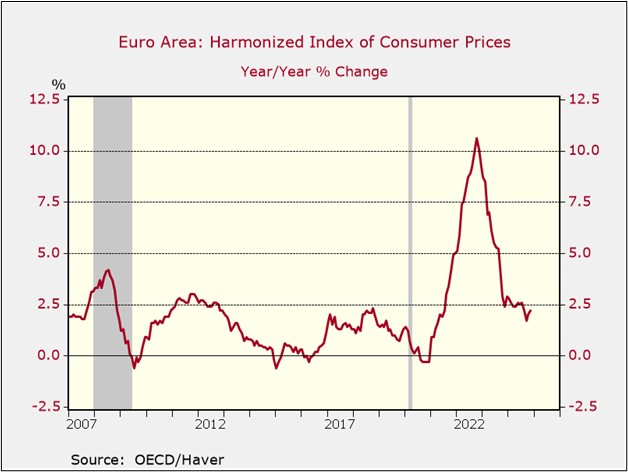Daily Comment (January 7, 2025)
by Patrick Fearon-Hernandez, CFA, and Thomas Wash
[Posted: 9:30 AM ET] | PDF
Our Comment today opens with new US moves to constrain the Chinese economy and military buildup. We next review several other international and US developments with the potential to affect the financial markets today, including some notes on yesterday’s resignation of Canadian Prime Minister Trudeau and a positive new outlook for artificial-intelligence darling Nvidia.
United States-China: The Department of Defense yesterday put a slew of additional high-profile Chinese companies on its list of firms that support the People’s Liberation Army. Firms added to the list include social media giant Tencent, electric-vehicle battery maker CATL, and shipping firm COSCO. Companies on the list aren’t automatically sanctioned, but Western firms and investors typically become skittish about doing business with them or investing in them.
- The action appears to mark yet another of the Biden administration’s parting shots at Beijing and its military.
- Biden’s outgoing China hawks may fear that President-elect Trump will be convinced by the Chinese and/or the internationalist business interests in his administration to go soft on Beijing. Indeed, Trump’s recent moves on immigration and tariffs suggest he will favor his corporate supporters over the populist nationalists in his coalition.
- As we outlined in our recent Outlook 2025 report, “Technology Sector Supporters” are a key part of Trump’s coalition. This constituency includes many tech leaders who hadn’t been close to Trump in the past but are investing heavily to curry favor with him to protect their business interests both domestically and internationally.
- In the latest example of this today, Meta CEO Mark Zuckerberg said Facebook and Instagram will stop fact-checking and end speech restrictions, aligning the platforms with Trump and his incoming administration.
North Atlantic Treaty Organization: In an interview with the Financial Times today, the chief of the NATO’s military committee said Western rating agencies, banks, and investors are being “stupid” for not investing more in defense companies. Consistent with our own analysis here at Confluence, Adm. Rob Bauer pointed to the huge amounts of new money European governments are pouring into defense rebuilding. We continue to believe that European and Asian defense stocks are especially well positioned to benefit from this new spending.
Eurozone: The December consumer price index was up 2.4% from the same month one year earlier, accelerating from a rise of 2.2% in the year to November and 2.0% in the year to October. Eurozone price inflation has now accelerated for three straight months and remains above the European Central Bank’s target of 2.0%. Because of the eurozone’s sluggish economic growth, the ECB is still expected to cut interest rates at its January 30 policy meeting, but sticky inflation will complicate the outlook for further rate cuts.
Canada: Prime Minister Trudeau announced his resignation yesterday, finally bowing to his many critics both within his Liberal Party and outside of it. The deeply unpopular Trudeau said he will stay on as prime minister until the party picks his successor, which could take several months. To forestall a no-confidence vote in the meantime, he also suspended parliament.
- Trudeau is the latest of the world’s progressive national leaders to lose power over issues such as weak economic growth, high price inflation, burgeoning debt, burdensome new climate regulations, and rising immigration.
- Going forward, Trudeau’s resignation leaves Pierre Poilievre and his right-wing Conservative Party in pole position to win Canada’s next parliamentary election. If Poilievre were to become prime minister, he would likely push pro-growth policies such as tax cuts and deregulation.
US Monetary Policy: Fed Vice Chair for Supervision Michael Barr yesterday said he will resign his regulatory role in February but will remain on the central bank’s board of governors. Barr has pushed for tough bank regulations, raising the prospect of conflicts with the incoming Trump administration and its plan to push for deregulation. Now, that prospect of conflict is much reduced, as Trump will be able to nominate his own vice chair from the other remaining Fed governors.
US International Trade Policy: Yesterday, President-elect Trump denied the Washington Post’s early morning report that his proposed big import tariffs would be limited to critical goods. True to character, he described the report as “fake news.” In response, the US dollar regained much of the value it had lost early in the day, with the US Dollar Index closing down only slightly.
US Economy: According to S&P Global, at least 686 companies in the US filed for bankruptcy in 2024, up about 8% from 2023 and the most since 2010, when filings associated with the Great Financial Crisis peaked at 828 filings. The report is a reminder that despite the US economy’s continued strong growth and moderating price inflation, it still has pockets of weakness. High interest rates have probably been one key reason for the rise in business failures.
US Technology Sector: Nvidia CEO Jensen Huang yesterday laid out a future vision for the firm that encompasses not only more growth in its current business of producing chips for developing artificial-intelligence systems, but also “trillions of dollars” of opportunities in areas such as robotics and self-driving vehicles. Given that Nvidia has been such a key driver of the US stock market over the last couple of years, a credible outlook for continued strong growth that can keep the stock’s price moving upward is important to the overall US market.
US Financial Services Industry: According to the Financial Times, the US private-equity industry is preparing to lobby the incoming Trump administration to broaden the types of investors that can invest in its funds. For example, one deregulation goal would be to allow defined contribution retirement plans, such as 401(k)s, to invest in private-equity funds.



